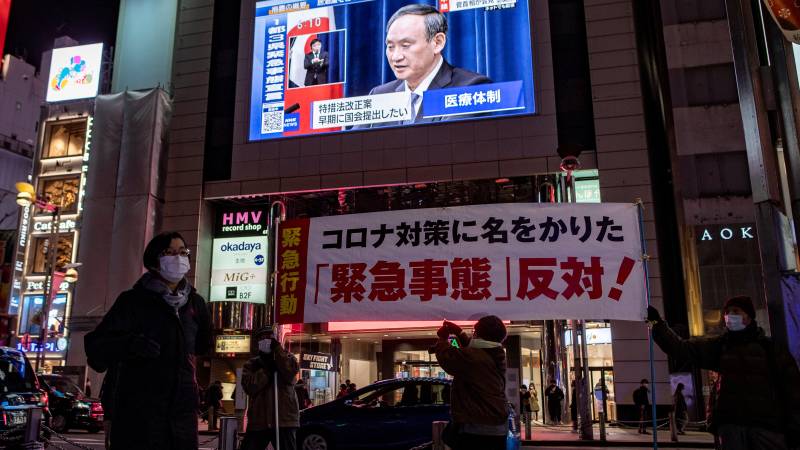Japan declares virus state of emergency in Tokyo region

Stay tuned with 24 News HD Android App

Japan's government declared a month-long coronavirus state of emergency in the greater Tokyo area on Thursday as the capital reported another record surge in daily infections.
Prime Minister Yoshihide Suga described a "great sense of crisis" as he announced the measure, which begins Friday and is less strict than the harsh lockdowns seen elsewhere or even the country's first virus emergency last spring.
It primarily targets restaurants and bars, which will be asked to stop serving alcohol by 7 pm and close an hour later.
Suga made a special appeal to young people to abide by the requests, saying that more than half of recent new infections in greater Tokyo were among the under-30s.
"Please act... in order to save precious lives of your parents, grandfathers, grandmothers and friends," he said.
In Tokyo and three surrounding areas that petitioned the government to make the move, businesses will also be urged to maximise teleworking with the goal of reducing commuter traffic by 70 percent.
Japanese law does not currently allow authorities to enforce cooperation with the requests, although the government is planning legislation permitting fines for businesses that do not comply.
For now, subsidies will be offered to businesses that close early, and the government could name-and-shame those that fail to do so.
Tokyo recorded 2,447 new cases on Thursday -- shattering the previous record of 1,591 logged a day earlier, and representing a sizeable chunk of the 7,490 new cases reported nationwide.
Still, Japan's outbreak remains comparatively small, with around 3,700 deaths overall.
Olympic countdown
The government had been reluctant to call a state of emergency for fear of sending the economy into reverse shortly after it emerged from recession.
"A contraction of GDP in Q1 is inevitable" with the new measure, Masamichi Adachi, Japan chief economist at UBS Securities told AFP. "Balancing economic and public health concerns is... a very difficult situation to manage."
Suga's approval ratings have nosedived over his handling of the latest Covid-19 wave -- particularly his government's controversial backing of a domestic travel campaign despite spiking case numbers.
He has said this emergency will be more limited and focused than last year's, despite warnings from medical experts that it may be insufficient.
Schools will not close and major events will be permitted, with the cap for spectators revised down.
The measure comes just over six months before the virus-postponed Tokyo 2020 Olympics are due to open, and Suga this week insisted he was still committed to holding the Games as "proof of mankind's victory over the virus".
But the emergency is likely to harden public opinion, with a majority opposed to holding the Games this year even before the third wave worsened.
Japan has yet to approve a coronavirus vaccine, with Suga saying he hopes the first jabs can begin in late February.
